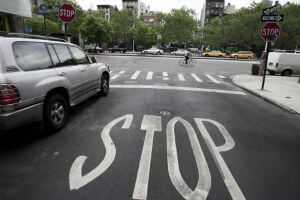 The right-of-way laws in Texas specify when drivers must yield to others. When these laws are broken, accidents with serious injuries can occur.
The right-of-way laws in Texas specify when drivers must yield to others. When these laws are broken, accidents with serious injuries can occur.
Below, we highlight some of the main right-of-way laws to help protect pedestrians, bicyclists, other drivers and yourself while on the road in the Lone Star State.
At Anderson & Cummings, our Fort Worth car accident attorneys work to protect the rights of accident victims. If you have been injured, we will investigate your claim and let you know if legal action could help you recover compensation for your injuries. Schedule a free, no obligation consultation today.
Call (817) 920-9000 so we can get started on your claim.
Intersections
At intersections, drivers must obey the right-of-way laws that apply to that type of intersection and situation, including the following:
- Unpaved Roads – Drivers on unpaved roads must yield the right-of-way to traffic on a paved road when coming to an intersection with a paved road.
- Uncontrolled Intersection – If there are no signs or signals at an intersection, yield to traffic already within the intersection. Proceed with caution.
- Making Turns – When turning left, yield to pedestrians crossing the street and traffic moving in the opposing lane. When turning right, yield to pedestrians crossing and the traffic within the lane you are turning into.
- Private Roads – At intersections to a main roadway from a private road, driveway or alley, traffic on the main road has the right-of-way.
- Railroad Crossings – At a railroad crossing, the train always has the right-of-way. Vehicles should stop at the stop line to avoid being hit by the moving train.
- End of Roadway – At an intersection at the end of a street that ends in a T, yield the right-of-way to traffic on the through street.
Emergency Vehicles
Texas drivers must give emergency vehicles the right-of-way. When an ambulance, fire truck or police vehicle is running its lights and sirens, move to the right of the roadway as soon as possible. If you are within an intersection when an emergency vehicle approaches behind you, proceed through the intersection and move to the right of the road as soon as possible.
School Buses
Drivers must yield the right-of-way to school buses. Some of these key laws in Texas are the following:
- Always stop if you approach a bus with its lights on and stop arm out, from either direction.
- You may pass the bus once it has resumed motion, the lights are not flashing, or the bus driver has signaled you to proceed.
- You are not required to stop if you are on a controlled-access highway and the school bus is in a loading zone where pedestrians are not allowed to cross.
Penalties for Not Yielding Right-of-Way to a School Bus
Texas takes school bus safety seriously. Below are the possible penalties you may face if you fail to yield the right-of-way to a school bus:
- First offense: fines up to $1,250
- Two or more offenses: fines from $1,000 to $2,000, and possible driver’s license suspension
- Offense causing bodily injury: fines up to $4,000 and a possible jail sentence of up to one year
- Offense causing bodily injury with a previous conviction of the same violation: a felony with fines up to $10,000 and a possible jail sentence of 180 days to two years
Pedestrians
Drivers are responsible for watching out for pedestrians at all times, including in these circumstances:
- When the light is green, pedestrians have the right-of-way even if there are no “walk” signals.
- Pedestrians within the crosswalk still have the right-of-way if the traffic light turns red.
- Pedestrians should be given the right-of-way even if they are breaking the law, to preserve safety.
Contact Our Lawyers Now
Following the right-of-way laws in Texas helps to preserve the safety of everyone on the road. When a right-of-way violation is a factor in an accident causing bodily injury, the at-fault driver may face fines of up to $10,000 and possible jail time.
At Anderson Cummings, our experienced injury lawyers will investigate your injury claim and determine whether right-of-way laws were broken, leading to the accident. We will fight to recover the compensation you deserve for medical bills, lost wages, and pain and suffering.
Schedule a free, no obligation consultation with our Fort Worth accident lawyers and learn what legal options may be available to you. We work on contingency, so you only pay us if we help you recover compensation.
Call (817) 920-9000 or fill out our Free Case Evaluation form now.